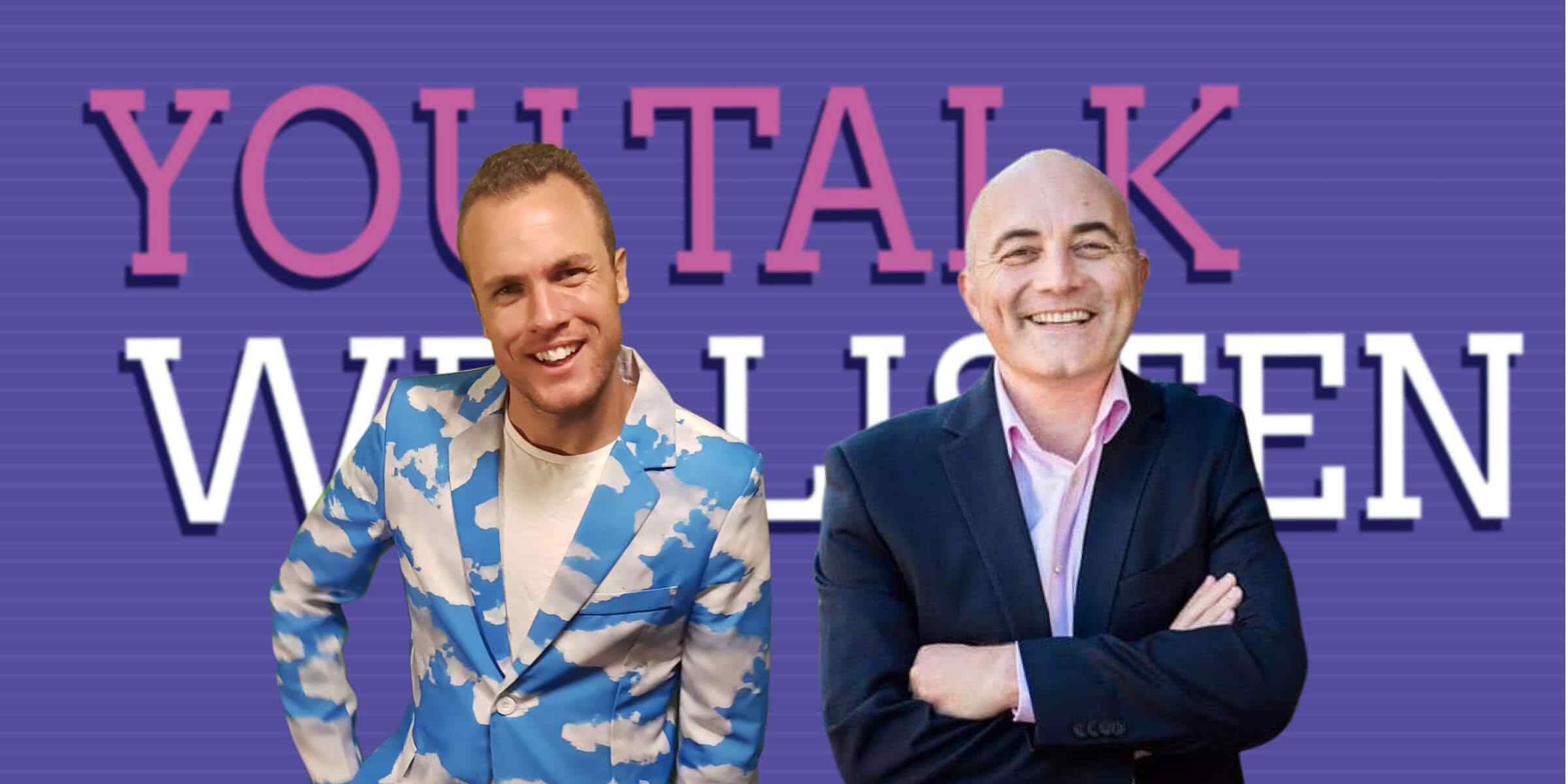Have you ever experienced attending a conference but you were on your mobile phone the whole time and was never connected with the speaker? Or maybe you experienced something similar like the person next to you was opening up about how their day went but you weren’t listening and have missed most of the important points of the entire conversation. In this episode, Oscar Trimboli shares the methods and techniques we can apply to be a better listener. We will also discuss how listening can be a crucial part of being successful.
Oscar Trimboli is an author, host of the Apple award-winning podcast Deep Listening and a sought-after keynote speaker. He is on a quest to create 100 million deep listeners in the world. He works with chairs, boards of directors, and executive teams and has experienced first-hand the transformational impact leaders can have when they listen beyond words. He believes that when leadership teams focus their attention and listening, they will build organisations that create powerful legacies for the people they serve.
The Importance of Deep Listening
My dad always says, “We’re born with two ears and one mouth so use them in that ratio,” so listen twice as much as you’re talking. But Oscar has a different ratio or rule: the 125-400 rule.
Oscar explains, “If we understand the neuroscience of listening that we speak at 125 words a minute, we can listen to 400 words a minute, so we’re programmed to be distracted before we even begin.”
“Most people aren’t conscious of the cost of not listening until they lose a great staff member or they lose a great customer because they haven’t paid attention and they haven’t listened, so the cost of not listening is project over-runs, projects over-budget or worst, projects that come in on time and on the budget but they don’t deliver to what people were actually asking for in the first place,” he adds.
Don’t let the complexities of IT be your distraction. Let us take care of your IT system.
How to Be a Better Listener
Notice When You Are Distracted
For most of us, what we need to get better at with our listening is simply to notice when we’re distracted.
“I’m not a perfect listener, far from it but what I do notice is I notice faster than anybody else when I’m distracted in the conversation. Most of us turn up to a conversation with our own radio station playing in our head. We’re tuned in to our own frequency, so we’re not available to actually listen to the other person, so if you know that you can listen to up to 400 words a minute, try and notice sooner rather than later when you get distracted, jump back into the conversation, focus in what’s being said.”
People are born thinking they can listen, but obviously that’s not the case. As time’s going on, we’re getting more and more distractions throughout our world. I know in the digital world, you can comfortably have 300 to 500 distractions a day just through advertising.
For a lot of us, we struggle with listening to ourselves. Most listening literature will teach you to focus on the speaker. They’re the most important person. That’s handy information but if you’re coming into a conversation and thinking, “Oh, I’ve just hung up the call and I’m thinking about the last call” or “I’m thinking about the next call” or “I’m moving from meeting to meeting” or “I’m jumping in the car and going to make a call, then I’m going to make another call”, we have got a whole dialogue going on in our head and we’re not actually available to listen because we can’t process their frequency. We’re blocking them with our own internal radio station.
86% of us struggle with a conversation already in our heads so we struggle with a combination of internal distractions and external distractions.
Oscar’s advice to remove distractions: switch your phone off, switch your laptop off or switch them into flight mode. Take off everything that buzzes, beeps and dings. If you can do that, you’ll increase your listening productivity by 50% immediately.
Change Your Mindset Around Speaking
Oscar says listening is our birthright. At 30 weeks, we can distinguish our mother’s voice from any other sound outside of our body. At 32 weeks, we can distinguish Beethoven from Bon Jovi from Bieber, so we can access music differently. Yet the moment we’re born, the minute we scream or make noises, is the beginning of thinking that that’s the way to communicate. Now communication’s 50% speaking and 50% listening—it’s one way or the other. But the truth is everyone can be a deep listener. You just have to unlearn all the things you’ve learned since you were born, which is making sure all the attention is through your speaking.
Keep Yourself Hydrated
Oscar adds that it’s important to hydrate the brain because listening is a difficult task at the best of times. A hydrated brain is a listening brain. It’s only 5% of the body mass but it consumes 5x more, 26% of the blood sugars in the body.
If I was talking to someone and and then I got off the phone and then my partner came into the room and said, “Hey, can you help me out?” I would usually say, “Hold on, I’ve just got to digest everything that was said before I can focus on what you’re saying.” I definitely take a moment to chill before I jump onto the next thing.
Have more time for your employees and customers when you make us your virtual firefighters. Talk to us to learn more!
4 Kinds of Terrible Listeners
The Dramatic Listener
The dramatic listener loves your story. They listen intently: they listen for emotion, they listen for detail. But the reason they’re listening is to simply say, “Oh, wow, you think you’ve got a tough boss, let me tell you about my boss. My boss is the worst boss.”
The Interrupting Listener
We love the interrupting listener because they’re obvious. The minute we draw breath to say our next sentence, the interrupting listener is in. They think it’s their commercial break to give you the opinion you fully haven’t articulated right now. And they’re genuinely trying to help. They’re speedy, they’re pacy, they want to move things further forward faster, but what they miss out on is that they’re not actually listening to the fullness of what everybody’s saying.
We can say 125 words a minute, but we can think of 900 words a minute. For about 100 words that a person says, there are 800 other words stuck in their head. If we just pause or say something as simple as “Tell me more” or “What else?” the magic code words come out.
The Lost Listener
The lost listener is kind of trying to figure out where they fit in the conversation and they just drift along in the dialogue. They are distracted by internal distractions but they can also be distracted by external distractions: laptops, mobile phones, other things that buzz and beep. It could also be visual distractions.
Sometimes they turn up to a meeting because they’re invited and they’re thinking if they just listen, they can figure out why they’ve been invited to the meeting as opposed to them simply saying, “Hey, before we go any further, how would you like me to contribute to this meeting?”
I know myself. At school, one of the worst things that I ever did was listen intently while having no clue about what they were talking about. I was sick for a couple of weeks, so when I got back to school, I wanted to put my hand up but I didn’t want to look stupid so I just sat there, trying to listen as much as possible but not really understanding what they’re saying at all.
The Shrewd Listener
The shrewd listener would stroke their chin or put their hand on their cheek. They listen intently. They tilt their head to the side, they give you lots of “Mm-hmm, tell me more.”
Shrewd listeners are disproportionately represented in sellers, accountants, lawyers, doctors, anybody who takes a brief, market researchers, advertising agencies, anybody who’s got to ask questions for a diagnosis. What’s going through their head is, “Really, that’s your problem. I can think about three other problems that are going to come up that you haven’t thought about but I guess I’m going to stay here and listen to you because I’m an expert in my field and I am so amazing I’m going to pretend that I’m listening”.
For the shrewd listener, what happens is while they’re pretending to listen and telling themselves how awesome they are and anticipating the next three problems, they’re forgetting to listen to what actually is the first problem. They’re kind of diagnosing a problem that the person might not have because they’re trying to explain just a lower-order problem there.
For a lot of us who are sellers of anything, we’re all in the business of selling ideas, whether we get paid for it or not, if we’re not careful, we can lose the person we’re engaging with because whether we think we’re giving a beautiful engaged face and giving lots of good “ah-hums” and “ah-has”, humans instinctively know with no training whatsoever whether you’re really listening or not.
Work on your business while we work in it. Learn more about our managed services!
How to Deal With People Who Are Terrible Listeners
Oscar shares, “A lot of people come to me and say, ‘Hey, I’m really good at listening but my boss is terrible. What tips should I give my boss?’ and I always say, ‘Just be a good listener for them. Parents will come up to me and go, ‘My kids don’t listen to me. How can I teach them how to listen better?’ and I say, ‘You already are teaching them. They’re just copying you.’
As a parent, you are your child’s listening teacher so when you communicate with your child, bend down to your kid’s eye level or if you can’t do that, lift your kids up to your eye level and that will completely transform the way your kids listen to you. Don’t stand up and pace or walk around the room while you’re talking to them. The very act of doing that brings your eyes to their eye level and there’s a lot more empathy for what they’re saying and how they’re saying it.
There’s a big difference between hearing and listening. Listening is the willingness to have your mind changed. The difference between hearing and listening is the action you take as a result of something you heard.
Listening Is Situational and Relational
Listening is situational and it’s relational. People listen differently in different situations. Oscar shares, “At home, I’m the lost listener and at work, I’m the shrewd listener. I’m forever going, ‘Wow, you really are struggling with listening, aren’t you? You’re really struggling with distraction.’ At home, I hear all about what happens in my family, with my in-laws, with the extended family, I can tell you a lot about 13A Orchard Road in Johannesburg where my in-laws grew up. I’ve heard so much intricate detail about that place and sometimes I just get lost.”
Oscar adds, “I’m far from a perfect listener. All I know is when I’m distracted, I’m able to get in a conversation faster. The other thing I always say that people are quite surprised, ‘Hey, Joshua, forgive me. I got distracted, do you mind saying that again?’ And if I say it genuinely, rather than three times in a row, what they normally do is they nod and smile and as one human to another, they know that they’ve done it themselves, and they go, ‘Yeah, sure, let me explain that’ and they probably explain it in a slightly different way.”
Take Oscar Trimboli’s Deep Listening Quiz.









